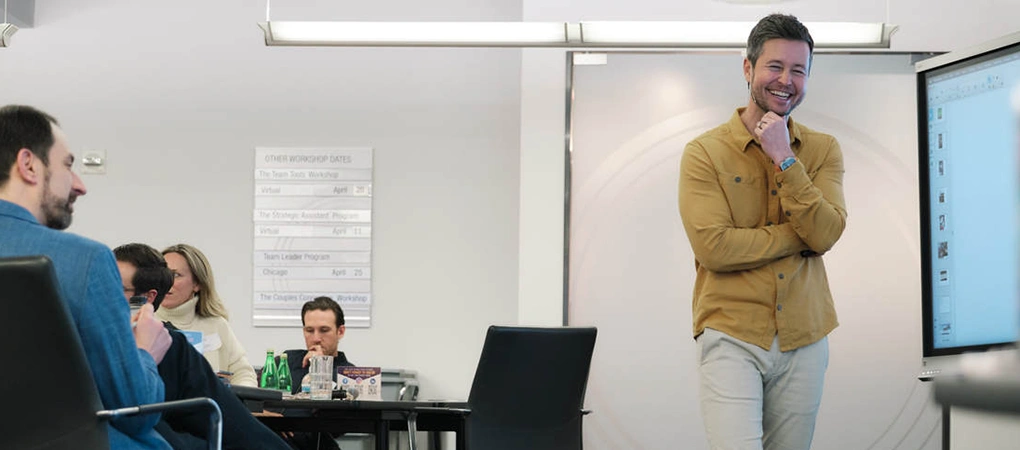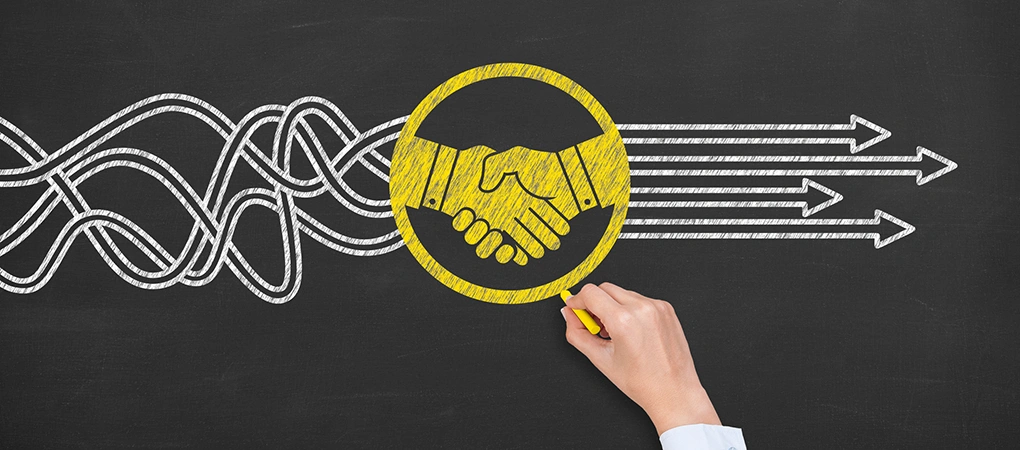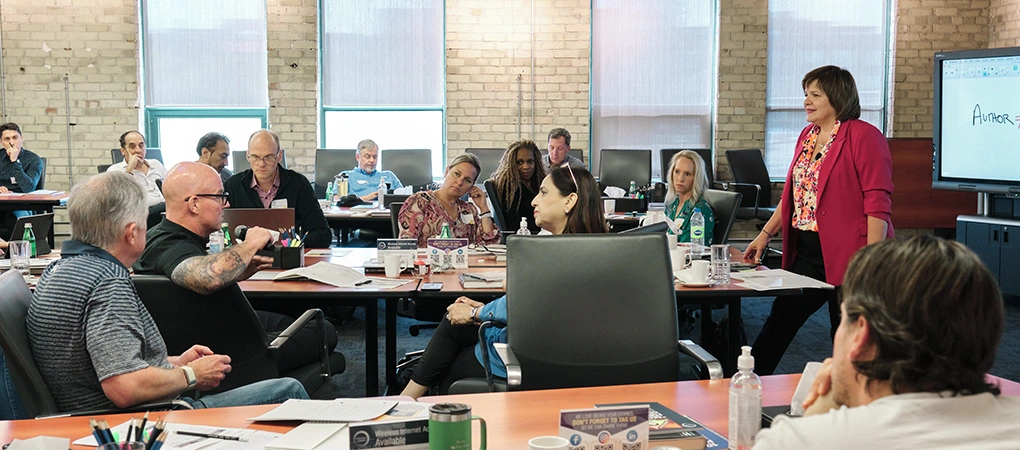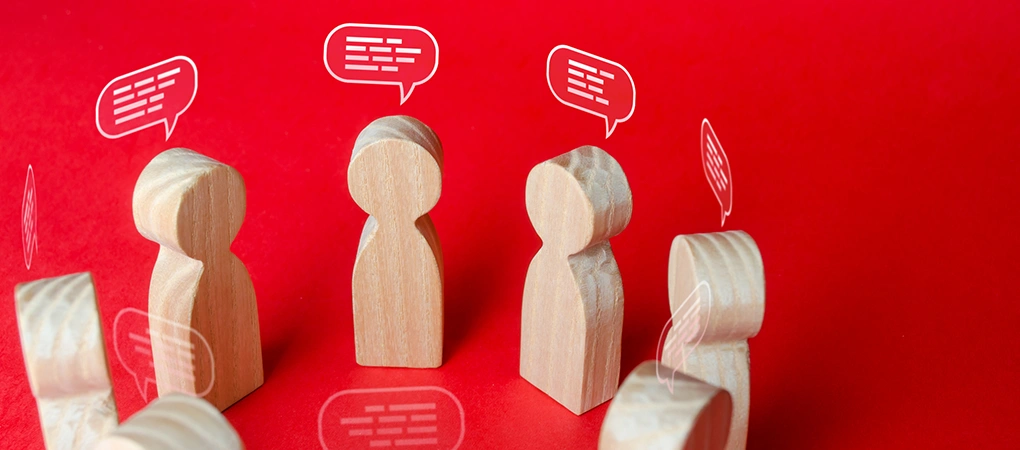7 Steps To Being A Great Interviewer
Shannon Waller
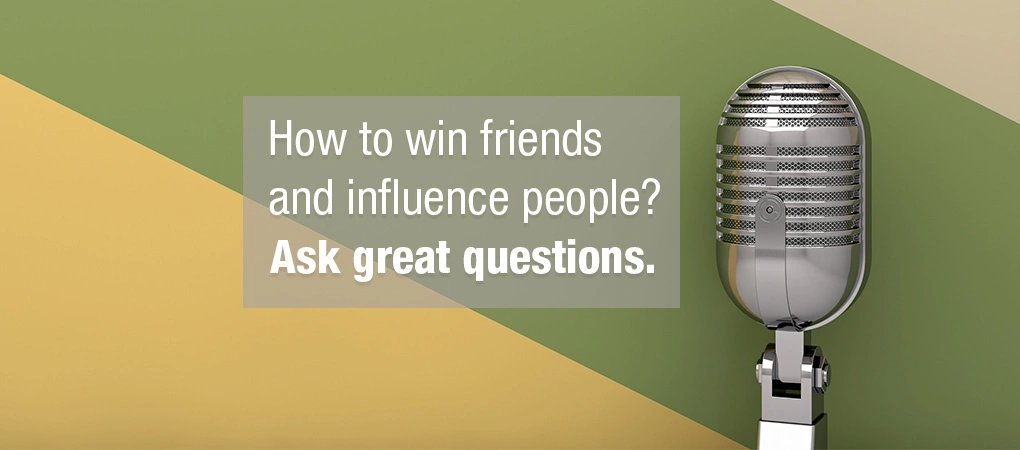
Are you looking for creative ways to build your brand and tell your story?
Interviewing might just be the secret weapon you’ve been looking for.
At Strategic Coach, we’ve learned that interviews can be a surprisingly potent marketing and value creation tool, and we’ve used that knowledge to get more content out to more people than we ever could before. In fact, we produce nine different series that all rely on great interviews between entrepreneurs or their team members, and stand proud knowing we’re putting out great information people can (and will) actually apply to their daily lives and businesses.
Whether you’re a seasoned interviewer or new to the game, interviews pose unique challenges and demand plenty of preparation. Yet they’re an amazing way for entrepreneurs and their team members alike to get clear on their thinking and make that knowledge available to other people—especially since so many of us find it easier to work through our ideas in discussion rather than on paper.
That makes the ability to facilitate a powerful, enriching conversation an absolutely phenomenal life skill. And what is an interview if not a conversation that just happens to be made public? The secret to getting the most out of your partner in any conversation—for drawing out their best wisdom and experience in a stimulating and captivating way—remains the same regardless of the context.
By learning how to consistently have clear, energizing, and powerful dialogues, you’ll become a hero to those listening to or engaging with you (and earn more gratitude and acknowledgment than you know what to do with!).
With that in mind, here are my seven golden rules for conducting a great interview.
1. Know The Audience
Both you and your interviewee need to be crystal clear on the purpose of the interview, which means understanding your target audience: Who’s meant to benefit from this information?
If you don’t know that, you risk having all their wonderful knowledge and experience fall on deaf ears … and wasting everyone’s time and energy in the process. The purpose of sharing information is to create value, and value is specific to the audience.
In other words, it’s not about you.
As an example, the most interesting discussion in the world about building a deck won’t do much good to an audience of condo owners. Likewise, that fun anecdote about the time you met Bill Murray might be better suited for your next dinner party than a talk on long-term care facilities.
Knowing your audience means knowing what excites them, what motivates them, and what frightens them, and value creation comes down to addressing all of those concerns.
When planning your interview, be sure to consider the following questions about your audience:
- What are their goals?
- What are their challenges?
- What are their opportunities?
- What are their strengths?
Everyone wants help identifying and reaching their goals, overcoming their challenges, taking advantage of upcoming opportunities, and building upon (or even simply recognizing) their strengths. If you take the time to address these foundational pieces, you can rest assured you’re putting out something people will want and benefit from.
2. Be Curious
Despite your preparation, however, it’s important to avoid the curse of knowledge, which refers to the idea that, when you reach a certain level of experience or education, you forget what it’s like to be a beginner. You forget what it’s like to be coming at something for the first time.
Even if you know all about the topic you’re discussing, you have to put yourself in the mindset of your audience. You have to ask questions that are kind of naive (which is different from stupid) on purpose, such as “What does this mean?” and “What’s the impact of that?”
If I’m in conversation with Dan, for example, I know we can dive right in to some pretty out-there ideas because we’ve got an established rapport and baseline of knowledge, but I still make sure to start off in the shallow end for people who might be new to our material or way of thinking. For all I know, they’re tuning in for the very first time, so it’s important to take a minute to define the concepts we’ll be working with.
The same thing goes for when I’m interviewing an author about their book. I never assume people have read it. (And in fact, the whole point is to get people to buy it!)
Want more tips on being a hero to your entrepreneur? Get your copy of The Team Success Handbook today!
3. Be Enthusiastic
It will come as a surprise to exactly no one who’s ever heard me speak that I am all about enthusiasm. Part of that is my personality, but part of it is actually really strategic, because you can’t just come at an interview intellectually. You have to come at it emotionally. If someone I’m interviewing does or says something fabulous, I make sure to acknowledge it in some way.
That’s because conversations are really just exchanges of energy, which means it’s crucial to give as much as you receive. If you’ve ever had a conversation with someone who’s uninterested, distracted, or closed off to what you have to say, you’ll understand what I mean. It totally derails your own energy and thinking process.
And it doesn’t take much. Facial expressions, body language, tone of voice—there are all sorts of subtle ways to communicate enthusiasm, and they all cue the person you’re interviewing to keep sharing, and encourage the audience to keep listening.
Never underestimate the power of enthusiasm for bringing out the best in someone!
4. Ask Great Questions
Obviously “great” is subjective and can mean a lot of different things to a lot of different people, but in this context, a great question is one that helps people go deeper. It’s authentic. It’s real. It invites further discussion rather than shutting it down.
Great questions are ones that ask for specifics, details, and examples, not yes or no answers, and they come from a place of genuine curiosity. Just about every comment, story, or opinion provides you with an opportunity to dig deeper by asking things like, “Then what happened?” or “What was the impact of that?” or “What did you do next?”
Great questions also help you explore a topic from all sides, so sometimes I’ll prompt for a contrasting view with questions like, “That sounds really great, but what happens if someone does this instead?” It’s an easy way to get your interviewee to think, sometimes in a way they never have before, so as you’re learning, they’re learning too.
I also like to use my questions to anticipate potential obstacles. I find it incredibly frustrating when someone just skims over the challenges or flaws in their viewpoint, so I do my best to eliminate that source of frustration for my own audience.
5. Be Fully Present
If you take away anything from this article, let it be the importance of being fully focused and present with whomever you’re in conversation with, whether interviewing or not. That means full-on eye contact. It means no technology or distractions. It means really being with that person, in that moment, curious and open. In other words, it means listening generously, which is a term from The Collaborative Way, a brilliant process for effective communication we share with everyone here at Coach.
To really understand listening generously, you have only to remember a time when someone wasn’t listening generously. As you’re talking, they’re scrolling through Facebook, watching the clock, tapping their feet impatiently, scanning the room to see who else is around, or all of the above. It’s a horrible experience and the fastest way to make someone lose their train of thought.
But when someone is actually listening? When they’re making eye contact, asking follow-up questions, and repeating things back to me to make sure they’ve understood? I feel so appreciated. I feel so much affection for them. I feel so connected.
We genuinely affect what people say and how they’re thinking by how we listen.
6. Start With What, Why, And How
I’m a very practical person, and I like to make my content practical too, which means everything I share with people has a clear definition, purpose, and application. It’s always focused on value creation.
No matter what you’re interviewing someone about, always make sure to address the following questions:
- What are you talking about?
- Why is this important?
- How can the listener take practical action on this information?
Do this every time, and you’ll always be confident you’ve created something worthwhile, because you’ve made it clear, concrete, and useful.
7. Use Strategic Summarizing
An interview is not an essay, which means it often takes unexpected twists and turns. A trick that I’ve learned to help people focus and stay engaged is to use strategic summarizing, which just means periodically reiterating the main points of our discussion.
This technique is also part of listening generously, because what we hear in conversation isn’t always what was said. So I’ll say things like, “If I understand correctly, is this what I’m hearing? Is this how I should be thinking about this?” Now the interviewee has an opportunity to make corrections, add or subtract details, and summarize. They have a chance to make their intent really clear.
Better conversations mean better relationships.
By following these seven steps, whether as an interviewer or simply when in conversation with others, you’ll ensure your interactions with people are energizing, fulfilling, and connecting. You’ll deepen your relationships, you’ll learn new and interesting information, and people will leave you feeling incredibly supported, appreciated, and intelligent—and love you for it.
And the added bonus? You’ll become known for being a great conversationalist!



